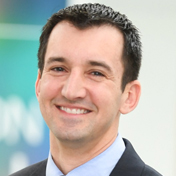
Ask a Compliance Officer Series: Regina Gore Cavaliere of Esperion discusses COVID-19 Compliance Challenges and Strategies for Re-entry of Field-Based Colleagues

Published 2020-06-15
We're continuing our series where Seton Hall Law School's Center for Health & Pharmaceutical Law sits down with a life sciences compliance officer to find out what is top-of-mind for him or her right now. In our latest installment in the series, Professor Jacob Elberg discusses the lifting of pandemic restrictions and re-entry of field-based professionals with Regina Gore Cavaliere.
Regina Gore Cavaliere, is Chief Ethics and Compliance Officer at Esperion, a pharmaceutical company that focuses primarily on developing and commercializing oral, non-statin therapies to lower elevated low-density lipoprotein cholesterol (LDL-C). Ms. Cavaliere is also a long-time faculty member of the Law School’s U.S. Healthcare Compliance Certificate Program and Plus Program.
First, allow me to say “thank you” to Seton Hall Law for the opportunity to share a few thoughts. In thinking about your questions, what comes to mind is the phrase, “Expect the Unexpected.” During my formative years and especially when I was learning to drive, this phrase was one of my mother’s constant refrains. As I write this, it seems like that phrase aptly sums up 2020. Except that no one—not government, not health care, not manufacturers of medical equipment and supplies, etc.—could have expected or predicted what 2020 had in store for us as a result of the COVID-19 pandemic. The ensuing lockdowns and quarantines have necessitated adjustments—in all facets of our professional and personal lives.
While many industries, small businesses, and individuals have suffered greatly, the life sciences industry has generally been fortunate in that it was able to pivot and adapt to the new world. In addition to the thousands of lives lost to this pernicious virus, there are many other lives simultaneously being negatively affected by other conditions and diseases that did not abate. Patients are weighing the fear of contracting the virus versus addressing other medical issues—some of an urgent nature. Our industry has an obligation to use innovative and compliant solutions to help ensure health care providers (HCPs) are aware of important product and safety information to afford appropriate patients the opportunity to have access to necessary therapies. Compliance and Commercial colleagues must work together more than ever before to adjust within the boundaries of the law. Our sales colleagues have adjusted to the environment by conducting virtual sales calls with electronic “viz aids” and videos and by using their Customer Relationship Management (CRM) platform to send medical, legal, and regulatory-approved introductory emails; our marketing colleagues have launched virtual speaker programs nationally; and we’ve shifted sampling from strictly rep-carry to a hybrid model including direct-to-practitioner shipments.
As we shifted to conversations about re-entry for our field-based colleagues, one thing became clear: there is no playbook for the comeback we all hope to see and no one can predict or forecast with certainty the timing of when activities may return to their prior state—if ever. With some jurisdictions still in lockdown and others re-opening with a multitude of restrictions, one area for compliance officers to consider is the impact of this new environment on their compliance program for field-based colleagues—ranging from how to conduct promotional activities to the type of personal protective equipment (PPE) necessary, as well as implications of the type and frequency of testing. Layering on individual institutional requirements—whether they are limitations on access and areas or temperature checks or other testing—further complicates the environment. Navigating through these disparities requires a thoughtful approach and it is likely that companies will need to continue multiple sales models since re-entry is not uniform.
The principles underpinning the compliance program remain the same: e.g., promote products accurately, truthfully, in a non-misleading manner in accordance with their FDA-approved labeling and with fair balance between benefits and risks; do not provide any remuneration to reward or induce prescribing decisions. But adjustments are necessary to address the varied practices and circumstances. The disparity in access due to state and local laws and institutional restrictions exacerbates potential compliance risks. Here are a few:
-
Goals and rewards: Goals drive results and behaviors. If overall strategies and sales targets remain unchanged in the post-pandemic era, the pressure to reach or exceed these goals can lead individuals to make poor decisions to overcome the limitations in access. Our industry’s history has shown how unattainable goals and the pressure to meet those goals can drive individuals to act in inappropriate ways—often in contravention of policies and ethics. And while an incentive compensation (IC) plan is designed to reward the appropriate promotion of products using both quantitative and qualitative data, the same model is not tenable in this new environment. With staggered re-entry and many variations on what “open” means, along with HCP offices switching to “no see,” should sales colleagues in jurisdictions with restrictions on interactions with HCPs have the same goals and IC structure as those who have open access to HCPs or fewer restrictions? Probably not. Thus, rather than having an IC plan that offers the same incentive structure to all sales colleagues promoting the same product, a new approach is needed and compliance officers will need to support the business by analyzing plan options and looking for blind spots that may increase the risk of non-compliance.
-
Promotional activities: Our company’s first two drugs were approved right on the cusp of the lockdown. An exciting period quickly turned into the challenge of a lifetime. As mentioned, our sales and marketing teams embraced virtual opportunities to promote our products and we started shipping samples directly to practitioners in response to their requests. Now that re-entry is underway, in-person promotional activities require a comprehensive plan involving PPE, testing, and how to handle the “what ifs.” Because protected health information of colleagues is involved, a cross-functional team including human resources, sales, privacy, legal, and compliance need to partner with the business to tackle a seemingly endless list of questions, such as, should daily temperatures be recorded? Should antibody testing be required? What if one doesn’t have the antibody—does that require a heightened standard of PPE? And so on. While an initial plan may be developed to address the questions, the team will need to continue evolving the plan in collaboration with the business and based on the changing external environment.
-
Monitoring plans: Communications with commercial teams should be more frequent than ever before to reinforce the availability of compliance support during these times. Flexibility in the plan is needed now, since field ride-alongs may not be practical at this time. However, the opportunity for remote monitoring of virtual interactions such as speaker programs, has greatly expanded and should be leveraged. Technology provides a platform to monitor more speaker programs and other events, such as virtual congresses, in an efficient manner. Likewise, focusing on records reviews involving a deeper analysis or larger sample of data (e.g., medical information inquiries, speaker program records, prescription drug sampling data, sales call data, co-pay card data, meal expenditures, and sign-in sheets) will strengthen the monitoring program during this period.
As compliance professionals in the life sciences industry, our positions require us to have a playbook for both the expected and the unexpected. To meet the challenges presented by this new and uncertain environment, our playbooks must evolve to support our collective mission of affording patients access to needed therapies.
Jacob T. Elberg is an Associate Professor of Law. He teaches in the areas of Health Care Fraud & Abuse and Data Analytics. Prior to joining Seton Hall, he served for more than a decade with the Department of Justice, including as Chief of the U.S. Attorney’s Office for the District of New Jersey’s Health Care & Government Fraud Unit. His scholarship focuses on corporate crime and compliance and the role of various actors in the enforcement of health care fraud laws and regulations. He is also a faculty advisor to the Law School’s Healthcare Compliance Certificate Programs held in the U.S., Europe, Asia, the Middle East, and Latin America. Professor Elberg's biography and publications are available online.





